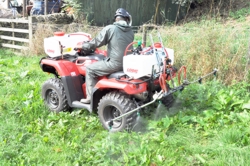Paddock Perfection - Weed Control
With a controlled grazing regime in place and topping occurring after each grazing period, there should be very little in the way of weeds to be concerned about. In pastures that are overgrazed and not topped, weeds can dominate the sward and in significant numbers they will reduce the productivity of the pasture, as they compete with the grasses for light and nutrients.

The most effective method of controlling established grassland weeds is by spraying with a selective herbicide. The best results from spraying are achieved when the weeds have a large proportion of leaf and are actively growing. The correct application of these chemicals is very important, as they are expensive and require even and accurate distribution to achieve the best results.
Pictured (left) is a Logic OBS690S Sprayer with 60 litre tank and OBS104 3 metre boom. Visit www.LogicToday.co.uk to see equipment from the Logic range working on video.
Many products now require a formally qualified user, possessing PA1 and/or PA6 qualifications to use a sprayer. This is relevant for knapsack sprayers too and is a legal requirement. There are a range of products available for qualified users, but the choice is more limited for knapsack use. If you have the correct qualifications and choose to do the work yourself, Logic can offer a wide range of sprayers to suit the size of area you need to treat and the host vehicle you intend to use. Using the most suitable equipment will allow you to make the most of opportunities when they arise, like the correct stage of growth in the target plant - and perfect weather, with a period of at least four hours without rain essential after the application, in order to allow the chemical to be absorbed and achieve the best results.
Don’t be tempted to treat weeds too early. However, once they develop flower heads, spraying is less effective and it is advisable to top them first and then spray the leafy re-growth. If you are unsure what your weed problems are, ask a local farmer or your agricultural merchant to point out the species which need to be controlled.
Docks are the most common weed, as they thrive under conditions of above average soil fertility. They are also the most pernicious and damaging of all grassland weeds, with a huge percentage of productive grassland having a serious infestation. Docks have half of the feed value of grass and are unpalatable. In general, animals will only eat them if there is nothing else available. There is a wide range of herbicides available for controlling docks and these have different levels of efficiency - and cost. Some will reduce the presence of clover in the sward unless spot spraying is carried out, although there are a number of herbicides which can be used that will save clover, so advice from your agricultural merchant is well advised.
Creeping thistle and spear thistle are the two most common thistle species in grassland. Creeping thistle has an extensive underground root system and is difficult to control with a single treatment and regular topping can be effective in weakening the plant before chemical treatment.
Nettles tend to grow in clumps in grazing fields or around fences and are easily controlled by spot spraying.
Buttercups and dandelions are best sprayed after the flower heads have been removed by topping.
Ragwort is a poisonous weed, although it is seldom eaten by grazing livestock. Topping or spraying makes ragwort more palatable and stock should be kept out of treated fields until the plants have completely decayed or have been removed. Many land owners prefer to pull ragwort and remove it from livestock rather than treating it, hence statements on the label for most herbicide products that fields should not be grazed if treated for poisonous weeds until those weeds have become unpalatable.
Chickweed has always been a threat to the establishment of late autumn reseeds but in recent years it has become more common in established grassland. This problem can normally be controlled with a suitable clover safe chemical.
Equine's Paddock Perfection series is written by the experts at Logic. The company's wide range of paddock, yard and arena equipment is designed and manufactured in the UK to provide top quality equipment at outstanding value for money. Visit www.LogicToday.co.uk to see the equipment working on video.
This article first appeared in the July issue of Equine. If you would like to read more of these expert Paddock Perfection articles in Equine magazine, back issues are available for secure online purchase from www.theeequinestore.co.uk where you can also subscribe to Equine.



